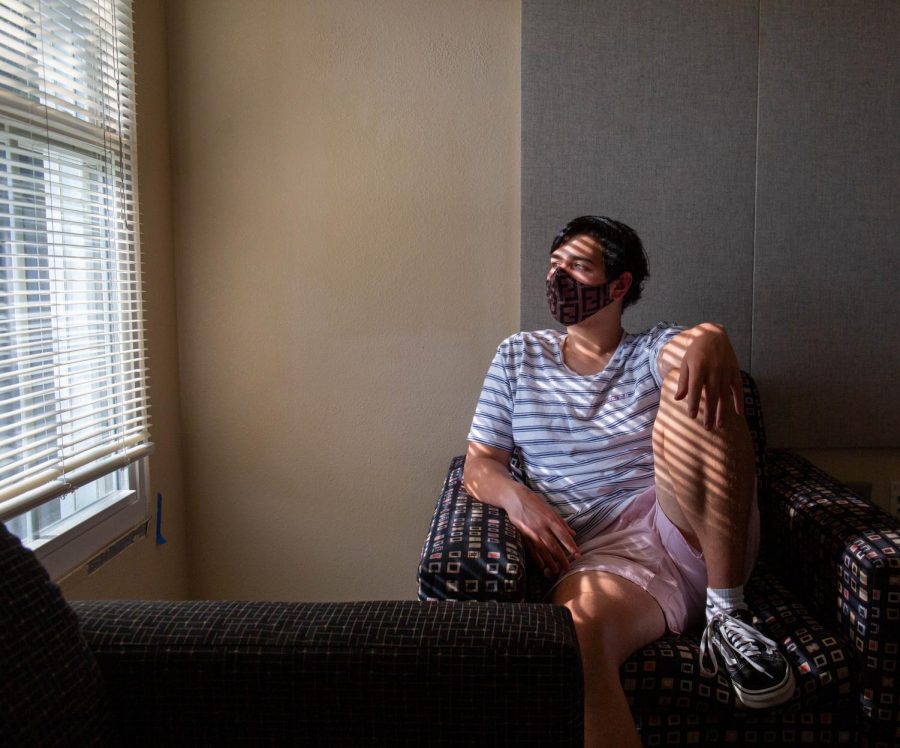Pandemic Worsens Mental Health for Students
Freshman Michael Manhard takes a break from online classes in a common area at the University of Utah on Oct. 10, 2020. (Photo by Gwen Christopherson | Daily Utah Chronicle)
November 24, 2020
Although students are coping with COVID-19, they are also dealing with another crisis: the pandemic’s negative effects on mental health.
At the University of Utah, students like Zach Janis have had a difficult time adjusting to the new norm. “As someone with depression, a lot of my coping comes from being in the company of others,” Janis said. According to him, the lack of face-to-face interaction has left students feeling desolate. “The social distancing was the hardest part. I like being around people and being outside.”
The unknown factors of the past few months have also led to an increase in student anxiety. “I’m more stressed about how up-in-the-air everything is. I’m a little uneasy about going to campus for anything,” Janis said.
Students have had to manage unexpected adjustments to their lives. Transitioning from in person learning to online learning has led a state of powerlessness to focus on education. A lack of motivation was reported by 76% of undergraduates and 56% of graduate students.
“Nobody was ready for this sudden change, and the fact that the university pushed on when, clearly, nobody knew how to handle it made it worse,” Janis said.
A lack of mental health awareness in students negatively impacts their schooling. According to the Suicide Prevention Center, energy levels, attention span, reliability, motivation and mental capacity are all affected by mental health. Research studies have shown that depression and lower grade point averages are correlated, and can be worsened if students are also suffering from anxiety. However, mental health awareness helps students discover what works for them with resources, different coping mechanisms and assistance from counselors, therapists or loved ones who are in the same footsteps.
Ever since the disease outbreak, students have been experiencing increased levels of anxiety, stress and depression brought on by factors such as financial issues and worry over the health of friends and family. Although these are things students consistently face throughout school, there was a 71% increase in student-enhanced stress caused by the pandemic. The Salt Lake Tribune reported that young people are around eight times more likely to be experiencing some sort of negative mental health symptom.
The Center for Disease Control found that 25.5% of adults 18-25 surveyed seriously considered suicide in the past 30 days. In the same study, 40% of respondents stated that they faced at least one negative mental health condition because of the pandemic.
Resources for students have transitioned to online formats. Therapy and counseling sessions at the U have moved to telemental health sessions through Zoom.
“There’s definitely a rise in student numbers,” said Christina Kelly, a counselor at the University Counseling Center. “Students have been seeking refuge in speaking to a counselor to maintain the transitions and uncertainty of this time.”
The UCC has expanded services this fall to adjust to the pandemic. During the spring semester, they are doing ongoing sessions through videoconferencing. Students may use a number of resources to improve their mental health, such as Mindfulness Center workshops, which have also moved online. Nonetheless, there will be face to face gatherings in the event of emergencies.
For more information and resources available to students, the UCC has compiled a list of clinical and crisis services, which can be accessed on their website.









Mith • Mar 6, 2021 at 1:06 am
Well written article and the author used facts and observations to raise awareness.
Rahma Ahmed • Feb 28, 2021 at 6:45 pm
The author really took the time to bring us updated information on this issue. I appreciate the statistics provided and real-life story shared. Mental health is something that seriously impacts everyone, especially college students so it made me feel good knowing that there are folks at The Chrony who care enough to write such a piece. I remember I struggled a lot when I was in college so I cannot begin to imagine how students are managing to survive during this time. Much love and sending strength to those who need. Salma– hats off to you! You are going places with these writing skills! Looking forward to reading more and more stories written by you. P.S.– I work as a journalist, and your story has inspired me to write something similar.